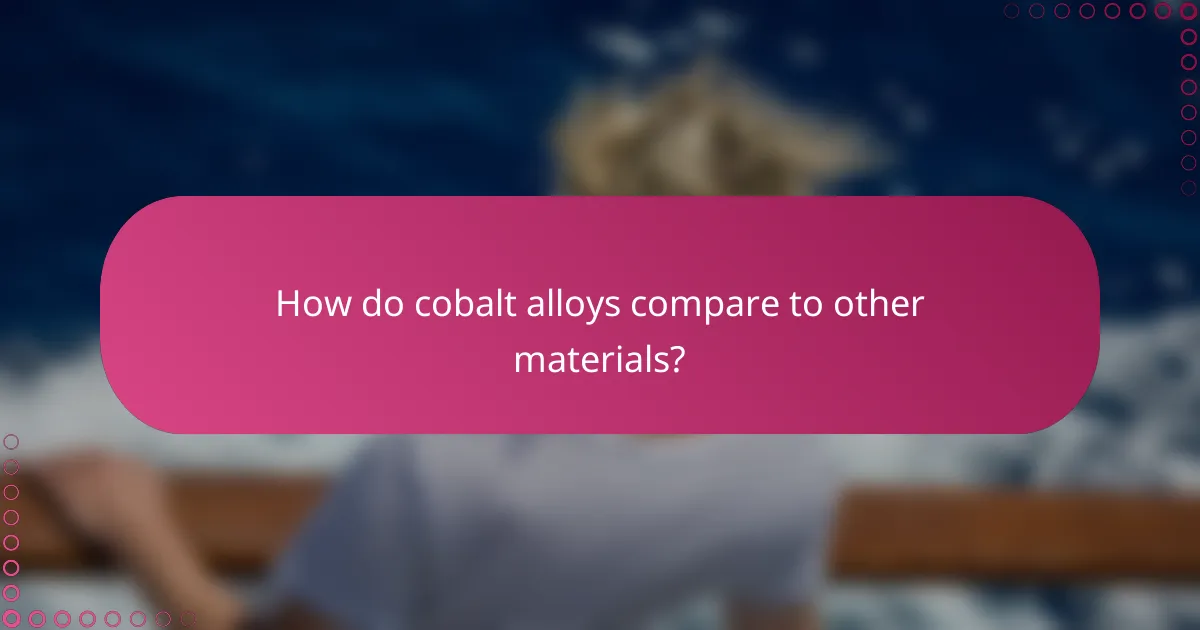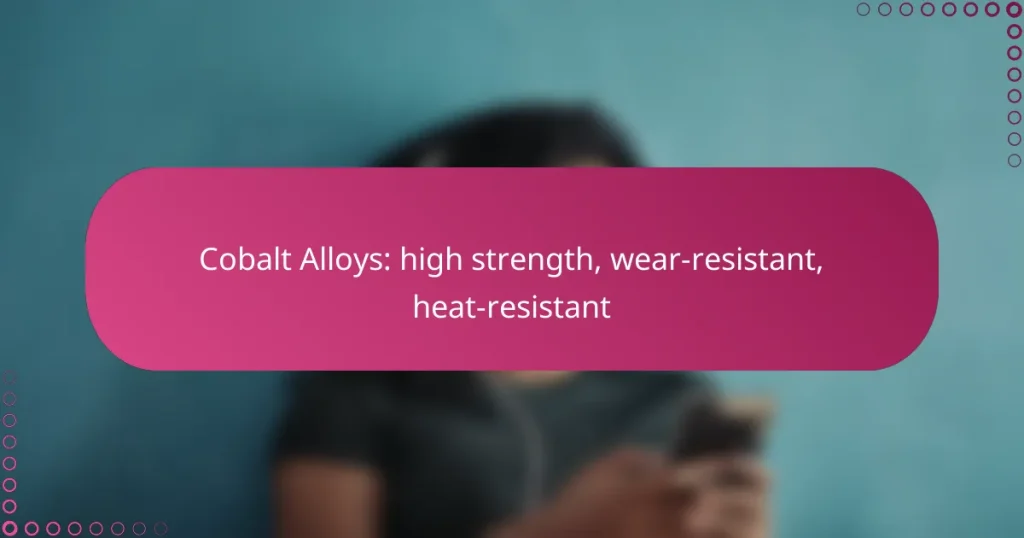Cobalt alloys are engineered for exceptional performance in high-strength, wear-resistant, and heat-resistant applications. Their unique properties make them particularly suitable for demanding environments across industries such as aerospace, medical, and industrial sectors, where durability and reliability are paramount.

What are the best applications for cobalt alloys?
Cobalt alloys are best suited for applications requiring high strength, wear resistance, and heat resistance. Their unique properties make them ideal for demanding environments in various industries.
Aerospace components
Cobalt alloys are extensively used in aerospace components due to their ability to withstand extreme temperatures and mechanical stress. They are commonly found in turbine blades, combustion chambers, and other critical engine parts.
When selecting cobalt alloys for aerospace applications, consider factors such as weight, corrosion resistance, and fatigue strength. Alloys like Co-Cr and Co-Ni are popular choices for their balance of performance and durability.
Medical implants
In the medical field, cobalt alloys are favored for implants due to their biocompatibility and resistance to wear. They are often used in joint replacements, dental implants, and surgical instruments.
Choosing the right cobalt alloy for medical applications involves ensuring compliance with health regulations and standards, such as ISO 10993. Alloys like Co-Cr-Mo are commonly used for their strength and corrosion resistance in bodily environments.
Oil and gas drilling tools
Cobalt alloys play a crucial role in oil and gas drilling tools, where they provide the necessary toughness and wear resistance. They are utilized in drill bits, downhole tools, and other equipment exposed to harsh conditions.
When using cobalt alloys in drilling applications, consider the specific environmental factors, such as temperature and pressure. Alloys with high cobalt content can offer improved performance in abrasive environments.
High-temperature furnace parts
Cobalt alloys are essential in high-temperature furnace parts, where they maintain structural integrity under extreme heat. They are used in furnace linings, burners, and other components that require thermal stability.
For applications in high-temperature environments, select cobalt alloys with excellent oxidation resistance and thermal fatigue properties. Alloys like Co-W and Co-Re are often recommended for their ability to perform reliably at elevated temperatures.

How do cobalt alloys compare to other materials?
Cobalt alloys are known for their exceptional properties, particularly in high-strength, wear-resistant, and heat-resistant applications. Compared to other materials like steel or titanium, cobalt alloys often outperform in demanding environments, making them ideal for aerospace, medical, and industrial uses.
Superior wear resistance
Cobalt alloys exhibit superior wear resistance due to their unique microstructure and hardness. This makes them particularly effective in applications where friction and abrasion are prevalent, such as in turbine engines and cutting tools. In many cases, cobalt alloys can last significantly longer than traditional materials, reducing maintenance costs and downtime.
For instance, in the manufacturing of components that experience high wear, cobalt alloys can provide a lifespan that is several times longer than that of standard steel. This durability translates to fewer replacements and lower overall operational costs.
Higher heat tolerance
One of the standout features of cobalt alloys is their higher heat tolerance compared to many other materials. They can maintain their mechanical properties at elevated temperatures, often exceeding 1000°C in certain applications. This makes them suitable for environments like jet engines and gas turbines where extreme heat is a factor.
In practical terms, this heat resistance allows cobalt alloys to perform reliably under conditions that would typically degrade other materials. Users should consider cobalt alloys when designing components that will be exposed to high thermal stress to ensure longevity and performance.
Enhanced strength-to-weight ratio
Cobalt alloys offer an enhanced strength-to-weight ratio, making them a preferred choice in applications where weight savings are critical without compromising strength. This characteristic is particularly valuable in aerospace and automotive industries, where reducing weight can lead to improved fuel efficiency and performance.
For example, components made from cobalt alloys can often be lighter than those made from steel while providing equal or greater strength. This advantage allows engineers to design more efficient systems that meet stringent performance criteria without the penalty of added weight.

What are the key properties of cobalt alloys?
Cobalt alloys are known for their high strength, wear resistance, and thermal stability, making them suitable for demanding applications in various industries. These properties enable cobalt alloys to perform effectively in environments that require durability and reliability.
High strength
Cobalt alloys exhibit exceptional high strength, which allows them to withstand significant stress and strain without deformation. This property is particularly beneficial in aerospace, medical, and industrial applications where components are subjected to heavy loads.
The high strength of cobalt alloys is often achieved through careful alloying and heat treatment processes. For instance, cobalt-chromium alloys can provide tensile strengths exceeding 1,200 MPa, making them ideal for high-performance applications.
Corrosion resistance
Corrosion resistance is another critical property of cobalt alloys, enabling them to maintain integrity in harsh environments. These alloys are particularly resistant to oxidation and can withstand exposure to various chemicals, making them suitable for use in marine and chemical processing industries.
The inherent corrosion resistance of cobalt alloys is attributed to the formation of a protective oxide layer on their surface. This layer helps prevent further degradation, ensuring longevity and reliability in applications such as turbine components and surgical implants.
Thermal stability
Cobalt alloys possess excellent thermal stability, allowing them to maintain their mechanical properties at elevated temperatures. This characteristic is vital for applications in high-temperature environments, such as gas turbines and heat exchangers.
Typically, cobalt alloys can retain their strength and hardness even at temperatures exceeding 800°C. This makes them a preferred choice for components that require consistent performance under thermal stress, reducing the risk of failure in critical applications.

What industries benefit from cobalt alloys?
Cobalt alloys are essential in various industries due to their high strength, wear resistance, and heat resistance. These properties make them ideal for applications requiring durability and reliability under extreme conditions.
Aerospace industry
The aerospace industry heavily relies on cobalt alloys for components that must withstand high temperatures and stresses, such as turbine blades and engine parts. These alloys provide excellent fatigue resistance and maintain structural integrity in harsh environments.
Manufacturers often choose cobalt-based superalloys for their ability to perform in temperatures exceeding 1,000°C. This capability is critical for jet engines, where material failure can lead to catastrophic results.
Medical industry
Cobalt alloys are widely used in the medical industry, particularly for surgical implants and prosthetics. Their biocompatibility and resistance to corrosion make them suitable for long-term use within the human body.
Common applications include hip and knee replacements, where cobalt-chromium alloys offer strength and wear resistance, ensuring longevity and performance. Regulatory standards, such as ISO 10993, guide the use of these materials in medical devices.
Manufacturing industry
In the manufacturing sector, cobalt alloys are utilized for cutting tools and wear-resistant components. Their hardness and durability allow them to perform effectively in high-speed machining and abrasive environments.
For example, cobalt-based tools can significantly extend tool life compared to standard steel, reducing downtime and costs associated with tool replacement. Companies often consider cobalt alloys when high performance and precision are required in production processes.

What factors should be considered when selecting cobalt alloys?
When selecting cobalt alloys, it is essential to consider application requirements, cost, and supplier reliability. Each of these factors plays a critical role in ensuring that the chosen alloy meets performance expectations and budget constraints.
Application requirements
Understanding the specific application requirements is crucial when selecting cobalt alloys. Consider factors such as the operating environment, temperature range, and mechanical stress levels. For instance, if the alloy will be used in high-temperature applications, ensure it has excellent heat resistance and maintains strength under stress.
Additionally, evaluate the wear resistance needed for the application. Cobalt alloys are often chosen for their durability in harsh conditions, so selecting one with appropriate wear characteristics is vital. A thorough analysis of the operational demands will guide you to the right alloy choice.
Cost considerations
Cost is a significant factor in the selection of cobalt alloys, as prices can vary widely based on material composition and market demand. Assess the total cost of ownership, which includes not only the purchase price but also processing, maintenance, and potential downtime costs. Cobalt alloys may be more expensive upfront, but their longevity can lead to savings over time.
It is also wise to compare prices from different suppliers and consider the availability of the alloy. Some cobalt alloys may be more readily available, which can impact lead times and overall project costs. Budgeting for potential fluctuations in raw material prices is advisable.
Supplier reliability
Choosing a reliable supplier is essential when selecting cobalt alloys. A dependable supplier ensures consistent quality and timely delivery, which are critical for maintaining production schedules. Research suppliers by checking their reputation, customer reviews, and industry certifications.
Establishing a good relationship with your supplier can also lead to better service and support. Consider suppliers who offer technical assistance and can provide insights into the best alloy choices for your specific needs. This partnership can enhance your project’s success and reduce risks associated with material failures.

What are the leading brands of cobalt alloys?
The leading brands of cobalt alloys include companies known for their high-performance materials, particularly in aerospace, medical, and industrial applications. Notable brands like Haynes International, Special Metals, and Stellite are recognized for their superior strength, wear resistance, and heat resistance.
Haynes International
Haynes International is a prominent manufacturer of cobalt alloys, particularly known for their Haynes 25 and Haynes 188 grades. These alloys are designed for extreme environments, offering excellent oxidation resistance and mechanical stability at high temperatures.
When selecting Haynes alloys, consider their applications in gas turbine engines and chemical processing. Their high strength-to-weight ratio makes them ideal for components that must endure significant stress and heat.
Special Metals
Special Metals produces a range of cobalt-based alloys, including the well-regarded Inconel series, which is often used in high-temperature applications. Their alloys are engineered for strength and corrosion resistance, making them suitable for harsh environments.
For industries like oil and gas, Special Metals’ cobalt alloys provide durability and reliability. It’s important to evaluate the specific alloy properties to match them with the operational requirements of your project.
Stellite
Stellite is a brand synonymous with cobalt-chromium alloys, known for their exceptional wear resistance and hardness. These alloys are commonly used in cutting tools, valve seats, and other applications where durability is critical.
When choosing Stellite alloys, consider their performance in high-friction environments. Their ability to withstand wear can significantly extend the lifespan of components, reducing maintenance costs over time.


